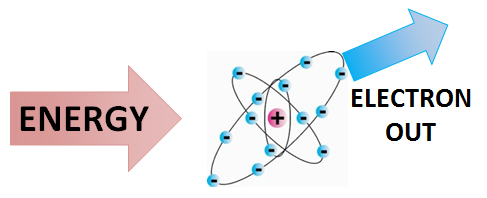Ionization

Ionization is the process where one or more ions are formed, generally through the loss of electrons from some neutral entity, resulting in a net positive charge.[2] Atoms also have an associated ionization energy or ionization potential. This energy is the energy needed to remove an electron from the neutral entity. Alkali metals, which have only a single electron in their outer shell, have the smallest ionization energies. Ionization energies are one of the most important factors that must be accounted for when looking at the strength of chemical bonds and predicting how chemicals will bond together.[3] As well, since nearly all atoms are found in their ground state, their most stable state, the ionization energy of the atom is determined to be the binding energy of the ground state of the atom.[4]
Ionizing Radiation
Radiation can be classified as "ionizing" if it has enough energy to eject an electron from some atom. Generally speaking, the energies of alpha and beta decay particles and gamma ray photons is higher than the ionization energies of atoms and molecules. This means that instead of being absorbed, these particles ionize the matter and break molecular bonds. These resulting particles are therefore known as ionizing radiation.[4] Ionizing radiation is important as it can produce a number of physiological side-effects, such as cancer.[5]
The idea that radiation can be ionizing is the basis for the operation of the Geiger counter, one detector of nuclear radiation. Geiger counters only detect ionizing radiation as they rely on the products of ionization to operate.
References
- ↑ Created internally by a member of the Energy Education team.
- ↑ IUPAC. (May 14, 2015). Compendium of Chemical Terminology [Online], 2nd ed. (the "Gold Book"),2006,"Ionization". Available: http://goldbook.iupac.org/I03183.html
- ↑ Hyperphysics. (May 19, 2015). Ionization Energy [Online]. Available: http://hyperphysics.phy-astr.gsu.edu/hbase/chemical/ionize.html
- ↑ 4.0 4.1 R. Knight. (May 20, 2015). Physics for Scientists and Engineers, 3rd ed. U.S.A.: Pearson
- ↑ Hyperphysics. (May 19, 2015). Ionizing Radiation [Online]. Available: http://hyperphysics.phy-astr.gsu.edu/hbase/mod4.html

